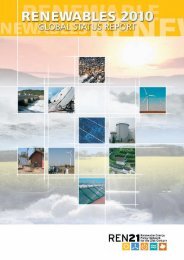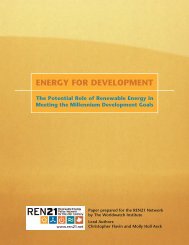RenewableS 2013 GlObal STaTUS RePORT - REN21
RenewableS 2013 GlObal STaTUS RePORT - REN21
RenewableS 2013 GlObal STaTUS RePORT - REN21
You also want an ePaper? Increase the reach of your titles
YUMPU automatically turns print PDFs into web optimized ePapers that Google loves.
FOREWORD<br />
Access to modern energy enables people to live better lives—<br />
providing clean heat for cooking, lighting for streets and homes,<br />
cooling and refrigeration, water pumping, as well as basic<br />
processing and communications. Yet over 1 billion people still<br />
lack access to modern energy services.<br />
As a result of the UN Secretary General’s Sustainable Energy for<br />
All Initiative and the upcoming Decade of Sustainable Energy<br />
for All, achieving universal energy access has risen to the top of<br />
the international agenda. However, given that the world recently<br />
passed 400 parts per million of atmospheric CO 2 —potentially<br />
enough to trigger a warming of 2 degrees Celsius compared<br />
with pre-industrial levels—meeting growing energy needs in<br />
a climate-constrained world requires a fundamental shift in<br />
how those energy services are delivered. Renewable energy,<br />
coupled with energy efficiency measures, is central to achieving<br />
this objective.<br />
Renewables already play a major role in the energy mix in many<br />
countries around the world. In 2012, prices for renewable<br />
energy technologies, primarily wind and solar, continued to fall,<br />
making renewables increasingly mainstream and competitive<br />
with conventional energy sources. In the absence of a level<br />
playing field, however, high penetration of renewables is still<br />
dependent on a robust policy environment.<br />
Overall, the rate of policy adoption has slowed relative to the<br />
early-to-mid 2000s. Revisions to existing policies have occurred<br />
at an increasing rate, and new types of policies have begun<br />
to emerge to address changing conditions. Integrated policy<br />
approaches that conjoin energy efficiency measures with the<br />
implementation of renewable energy technologies, for example,<br />
are becoming more common.<br />
Global investment in renewable energy decreased in 2012,<br />
but investment expanded significantly in developing countries.<br />
Global investment decreased in response to economic and<br />
policy-related uncertainties in some traditional markets, as well<br />
as to falling technology costs, which had a positive effect on<br />
capacity installations. Renewable energy is spreading to new<br />
regions and countries and becoming increasingly affordable in<br />
developing and developed countries alike.<br />
At the same time, falling prices, combined with declining policy<br />
support in established markets, the international financial<br />
crisis, and ongoing tensions in international trade, have challenged<br />
some renewable energy industries. Subsidies to fossil<br />
fuels, which are far higher than those for renewables, remain<br />
in place and need to be phased out as quickly as possible. The<br />
emergence of shale gas brings a new dynamic to the energy<br />
market, and it remains to be seen how it will affect renewable<br />
energy deployment globally.<br />
Despite fiscal and policy uncertainties, renewables are bringing<br />
modern energy services to millions of people, and increasingly<br />
meeting the growing demands for energy in many countries.<br />
Widespread deployment of renewable energy technologies is<br />
changing the energy-access dynamic in a number of developing<br />
countries, and is turning rural villages into thriving centres<br />
of commerce. Globally, in just five years, solar PV soared from<br />
below 10 GW in 2007 to just over 100 GW in 2012. In the EU,<br />
renewables accounted for almost 70% of new electric generating<br />
capacity in 2012.<br />
We stand on the cusp of renewables becoming a central<br />
part of the world’s energy mix. As technical constraints are<br />
overcome, most of the alleged limitations to achieving higher<br />
shares of renewables are due to a lack of political will to enact<br />
the necessary policies and measures. It is time to address this<br />
remaining hurdle. The Renewables <strong>2013</strong> Global Status Report<br />
provides renewable energy proponents and decision makers<br />
with information and motivation to tackle the challenges ahead.<br />
On behalf of the <strong>REN21</strong> Steering Committee, I would like to<br />
thank all those who have contributed to the successful production<br />
of the GSR <strong>2013</strong>. These include lead author/research<br />
director Janet L. Sawin, together with the other section authors;<br />
the GSR project managers, Rana Adib and Jonathan Skeen; and<br />
the entire team at the <strong>REN21</strong> Secretariat, under the leadership<br />
of Christine Lins. Special thanks go to the ever-growing network<br />
of more than 500 contributors, including authors, researchers,<br />
and reviewers, who participated in this year’s process and<br />
helped make the GSR <strong>2013</strong> a truly international and collaborative<br />
effort.<br />
The REN 21 Renewables <strong>2013</strong> Global Status Report provides<br />
useful insight into the global renewable energy market and<br />
policy arena. I trust that it will serve as an inspiration for your<br />
work towards a rapid worldwide transition to a renewable<br />
energy future.<br />
Arthouros Zervos<br />
Chairman of <strong>REN21</strong><br />
3




